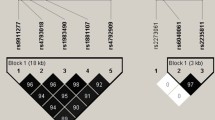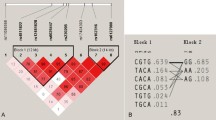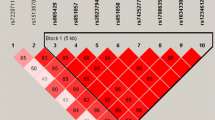Abstract
Summary
In a candidate gene association study, we found that SMAD2 promoter alleles and haplotypes were significantly associated with bone mineral density (BMD) at the lumbar spine and various proximal femur sites. Our results suggest that SMAD2 polymorphisms may be one of genetic determinants of BMD in postmenopausal women.
Introduction
SMAD2, which is the specific intracellular transducer of TGF-ß, is thought to participate in bone metabolism by playing a critical role in the development and function of osteoclasts and osteoblasts. We performed association analyses of the genetic variation in SMAD2 to ascertain the contribution of this gene to BMD and risk of osteoporotic fracture.
Methods
We selected three SMAD2 promoter single-nucleotide polymorphisms (SNPs) based on heterozygosity and validation status. Postmenopausal Korean women (n = 1,329) were genotyped for these SNPs, and their BMD and risk of fractures were assessed. BMD at the lumbar spine and proximal femur was measured using dual-energy X-ray absorptiometry. P values were corrected for multiple testing by the effective number of independent marker loci (P cor).
Results
We found that SMAD2 -35302C>T, -34952A>G, and ht2 were significantly associated with BMD at both the lumbar spine and femur neck (P cor = 0.020–0.046), whereas SMAD2 -36201A>G and ht1 affected the femur neck BMD (P cor = 0.018–0.031). The genetic effects of these three polymorphisms on BMD at the lumbar spine and femur neck were risk-allele dependent in additive model. The three polymorphisms and two hts were also significantly associated with BMD at other proximal femur sites, such as the total femur, trochanter, and femur shaft (P cor = 0.001–0.046). However, none of the polymorphisms or hts was associated with an increased risk of fracture.
Conclusions
Our results suggest that SMAD2 polymorphisms may be one of genetic determinants of BMD in postmenopausal women.

Similar content being viewed by others
References
Arden NK, Spector TD (1997) Genetic influences on muscle strength, lean body mass, and bone mineral density: a twin study. J Bone Miner Res 12:2076–2081
Slemenda CW, Christian JC, Williams CJ, Norton JA, Johnston CC Jr (1991) Genetic determinants of bone mass in adult women: a reevaluation of the twin model and the potential importance of gene interaction on heritability estimates. J Bone Miner Res 6:561–567
Song B, Estrada KD, Lyons KM (2009) Smad signaling in skeletal development and regeneration. Cytokine Growth Factor Rev 20:379–388
Janssens K, ten Dijke P, Janssens S, Van Hul W (2005) Transforming growth factor-beta1 to the bone. Endocr Rev 26:743–774
Houde N, Chamoux E, Bisson M, Roux S (2009) Transforming growth factor-{beta}1 (TGF-{beta}1) induces human osteoclast apoptosis by up-regulating bim. J Biol Chem 284:23397–23404
Takai H, Kanematsu M, Yano K, Tsuda E, Higashio K, Ikeda K, Watanabe K, Yamada Y (1998) Transforming growth factor-beta stimulates the production of osteoprotegerin/osteoclastogenesis inhibitory factor by bone marrow stromal cells. J Biol Chem 273:27091–27096
Geiser AG, Zeng QQ, Sato M, Helvering LM, Hirano T, Turner CH (1998) Decreased bone mass and bone elasticity in mice lacking the transforming growth factor-beta1 gene. Bone 23:87–93
Nicks KM, Perrien DS, Akel NS, Suva LJ, Gaddy D (2009) Regulation of osteoblastogenesis and osteoclastogenesis by the other reproductive hormones, activin and inhibin. Mol Cell Endocrinol 310:11–20
Sakai R, Miwa K, Eto Y (1999) Local administration of activin promotes fracture healing in the rat fibula fracture model. Bone 25:191–196
Sakai R, Fujita S, Horie T, Ohyama T, Miwa K, Maki T, Okimoto N, Nakamura T, Eto Y (2000) Activin increases bone mass and mechanical strength of lumbar vertebrae in aged ovariectomized rats. Bone 27:91–96
Nathan M, Pope MH, Grobler LJ (1994) Osteophyte formation in the vertebral column: a review of the etiologic factors—Part II. Contemp Orthop 29:113–119
Jo JM, Kim GS, Kim SW, Shin JW, Moon DH, Lee HK (1999) Cross-calibration of bone mineral density between two different dual X-ray absorptiometry systems: hologic QDR 4500-A and lunar EXPERT-XL. Korean J Nucl Med 33:282–288
Kiel D (1995) Assessing vertebral fractures. National osteoporosis foundation working group on vertebral fractures. J Bone Miner Res 10:518–523
Genant HK, Wu CY, van Kuijk C, Nevitt MC (1993) Vertebral fracture assessment using a semiquantitative technique. J Bone Miner Res 8:1137–1148
Livak KJ (1999) Allelic discrimination using fluorogenic probes and the 5′ nuclease assay. Genet Anal 14:143–149
Yuan HY, Chiou JJ, Tseng WH, Liu CH, Liu CK, Lin YJ, Wang HH, Yao A, Chen YT, Hsu CN (2006) FASTSNP: an always up-to-date and extendable service for SNP function analysis and prioritization. Nucleic Acids Res 34:W635–641
Zhao F, Xuan Z, Liu L, Zhang MQ (2005) TRED: a transcriptional regulatory element database and a platform for in silico gene regulation studies. Nucleic Acids Res 33:D103–D107
Hedrick PW (1987) Gametic disequilibrium measures: proceed with caution. Genetics 117:331–341
Barrett JC, Fry B, Maller J, Daly MJ (2005) Haploview: analysis and visualization of LD and haplotype maps. Bioinformatics 21:263–265
Stephens M, Smith NJ, Donnelly P (2001) A new statistical method for haplotype reconstruction from population data. Am J Hum Genet 68:978–989
Nyholt DR (2004) A simple correction for multiple testing for single-nucleotide polymorphisms in linkage disequilibrium with each other. Am J Hum Genet 74:765–769
Ciovacco WA, Cheng YH, Horowitz MC, Kacena MA (2010) Immature and mature megakaryocytes enhance osteoblast proliferation and inhibit osteoclast formation. J Cell Biochem 109:774–781
Bord S, Frith E, Ireland DC, Scott MA, Craig JI, Compston JE (2005) Megakaryocytes modulate osteoblast synthesis of type-l collagen, osteoprotegerin, and RANKL. Bone 36:812–819
Ciovacco WA, Goldberg CG, Taylor AF, Lemieux JM, Horowitz MC, Donahue HJ, Kacena MA (2009) The role of gap junctions in megakaryocyte-mediated osteoblast proliferation and differentiation. Bone 44:80–86
Kacena MA, Shivdasani RA, Wilson K, Xi Y, Troiano N, Nazarian A, Gundberg CM, Bouxsein ML, Lorenzo JA, Horowitz MC (2004) Megakaryocyte-osteoblast interaction revealed in mice deficient in transcription factors GATA-1 and NF-E2. J Bone Miner Res 19:652–660
Beeton CA, Bord S, Ireland D, Compston JE (2006) Osteoclast formation and bone resorption are inhibited by megakaryocytes. Bone 39:985–990
Kacena MA, Nelson T, Clough ME, Lee SK, Lorenzo JA, Gundberg CM, Horowitz MC (2006) Megakaryocyte-mediated inhibition of osteoclast development. Bone 39:991–999
Rivadeneira F, Styrkarsdottir U, Estrada K, Halldorsson BV, Hsu YH, Richards JB, Zillikens MC, Kavvoura FK, Amin N, Aulchenko YS, Cupples LA, Deloukas P, Demissie S, Grundberg E, Hofman A, Kong A, Karasik D, van Meurs JB, Oostra B, Pastinen T, Pols HA, Sigurdsson G, Soranzo N, Thorleifsson G, Thorsteinsdottir U, Williams FM, Wilson SG, Zhou Y, Ralston SH, van Duijn CM, Spector T, Kiel DP, Stefansson K, Ioannidis JP, Uitterlinden AG (2009) Twenty bone-mineral-density loci identified by large-scale meta-analysis of genome-wide association studies. Nat Genet 41:1199–1206
Uusitalo H, Hiltunen A, Ahonen M, Gao TJ, Lefebvre V, Harley V, Kahari VM, Vuorio E (2001) Accelerated up-regulation of L-Sox5, Sox6, and Sox9 by BMP-2 gene transfer during murine fracture healing. J Bone Miner Res 16:1837–1845
Koh JM, Oh B, Lee JY, Lee JK, Kimm K, Park BL, Shin HD, Lee IK, Kim HJ, Hong JM, Kim TH, Kim GS, Kim SY, Park EK (2007) Association of FLT3 polymorphisms with low BMD and risk of osteoporotic fracture in postmenopausal women. J Bone Miner Res 22:1752–1758
Koh JM, Oh B, Ha MH, Cho KW, Lee JY, Park BL, Shin HD, Bae MA, Kim HJ, Hong JM, Kim TH, Shin HI, Lee SH, Kim GS, Kim SY, Park EK (2009) Association of IL-15 polymorphisms with bone mineral density in postmenopausal Korean women. Calcif Tissue Int 85:369–378
Kim GS, Koh JM, Chang JS, Park BL, Kim LH, Park EK, Kim SY, Shin HD (2005) Association of the OSCAR promoter polymorphism with BMD in postmenopausal women. J Bone Miner Res 20:1342–1348
Peacock M, Turner CH, Econs MJ, Foroud T (2002) Genetics of osteoporosis. Endocr Rev 23:303–326
Cho YS, Go MJ, Kim YJ, Heo JY, Oh JH, Ban HJ, Yoon D, Lee MH, Kim DJ, Park M, Cha SH, Kim JW, Han BG, Min H, Ahn Y, Park MS, Han HR, Jang HY, Cho EY, Lee JE, Cho NH, Shin C, Park T, Park JW, Lee JK, Cardon L, Clarke G, McCarthy MI, Lee JY, Oh B, Kim HL (2009) A large-scale genome-wide association study of Asian populations uncovers genetic factors influencing eight quantitative traits. Nat Genet 41:527–534
Deng HW, Chen WM, Recker S, Stegman MR, Li JL, Davies KM, Zhou Y, Deng H, Heaney R, Recker RR (2000) Genetic determination of Colles’ fracture and differential bone mass in women with and without Colles’ fracture. J Bone Miner Res 15:1243–1252
MacGregor A, Snieder H, Spector TD (2000) Genetic factors and osteoporotic fractures in elderly people. Twin data support genetic contribution to risk of fracture. BMJ 320:1669–1670, author reply 1670–1671
Eisman JA (1999) Genetics of osteoporosis. Endocr Rev 20:788–804
Acknowledgements
This work was supported by a grant of the Korea Health 21 Research and Development Project, Ministry of Health and Welfare, Republic of Korea (project no. A010252).
Conflicts of interest
None.
Author information
Authors and Affiliations
Corresponding authors
Additional information
Beom-Jun Kim and Joo-Yeon Hwang contributed equally to this work.
Rights and permissions
About this article
Cite this article
Kim, BJ., Hwang, JY., Han, BG. et al. Association of SMAD2 polymorphisms with bone mineral density in postmenopausal Korean women. Osteoporos Int 22, 2273–2282 (2011). https://doi.org/10.1007/s00198-010-1450-8
Received:
Accepted:
Published:
Issue Date:
DOI: https://doi.org/10.1007/s00198-010-1450-8




